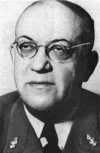The history of humans and drug use is a
fascinating one. Human beings have been
using mood-altering substances since the dawn of time. Traces of alcohol have been found in pots
excavated from ancient dig sites in Greece and Rome. For centuries the biggest trade commodities world wide have been alcohol, nicotine, coffee and opiates, mood altering substances all.
It seems that something about being human
makes us want to alter our state of mind and the Fuhrer was not immune.
Amphetamine was synthesised for the first
time in 1887 by a chemist working at the University of Berlin named Lazăr
Edeleanu (given the subject of this story, it is perhaps relevant that he was a
Romanian Jew). Methamphetamine, a
related compound, came along in 1893 thanks to a Japanese chemist named Nagai
Nagayoshi. It was first marketed in 1900
under the trade name Benzdrine as a bronchodilator and an appetite suppressant. Most people are more aware of amphetamine today by its street names such as ice, speed and ecstasy. They are also probably much more aware of its other properties. Amphetamine, and its related compounds are
very, very good stimulants.
Unfortunately they also have a number of deleterious side effects. These include paranoia, agitation, hallucinations, florid psychosis and rapid increasing dependence.
Over the years several nations have experiemented with amphetamines to help their soldiers stay awake. Perhaps the most notorious
culprit in this department was the German army. During World War II thousands of German soldiers became addicted
to methamphetamine, marketed as Pervitin.
There’s no concrete evidence that Hitler
was also using Pervitin. However the hearsay is
fairly compelling. Given the widespread
use of the drug by the German army, it is certain that its
properties were very well known to him.
What is known is that every morning from 1941 Theodor Morell, Hitler’s personal physician,
attended him and gave him an intravenous
injection. Throughout 1943 these
injections began to be administered at several times throughout the day. Reportedly these injections contained 'vitamins', however following their administration Hitler was said to become very active, alert, happy, talkative
and able to stay awake for great periods of time.
(Dr. Theodor Morell)
Hitler is widely described as having been
insane especially as his behaviour and military judgement became increasingly
erratic. A lack of judgement led to the
complete disaster of the Battle of Stalingrad in 1943 and from there the tide
of war turned significantly against the Nazis.
He became increasingly paranoid and
aggressive. He developed a shake in his
left hand, attributed by some to Parkinson’s, but also possibly a side effect
of the drugs. Previously very clear on
the importance of personal responsibility, Hitler began to blame his
subordinates, often violently, for lapses in judgement that were clearly his
fault.
While these symptoms can also be due to
schizophrenia, Hitler was 53 in 1942, which is unusually old for a psychotic
mental disorder to make its first appearance.
No, it seems likely that Hitler was a
speed addict.
Methamphetamine is a dangerous drug of addiction which is causing us
enormous problems in many societies. Nonetheless,
perhaps we owe a debt of gratitude to Lazăr Edeleanu. After all, the effects of methamphetamine probably helped the Allies win the war.


How odd - I could have sworn I left a comment on this post. Anyway, I am here to let you know I have passed on a blog award to you and your blog of awesomeness..
ReplyDeleteI'd like to thank the academy *weeps*.
ReplyDeleteNow I need to work out what to do wiv it...
I know this post is more than a year old, but you clearly dont know what youre talking about. You didnt even know that Hitler was 53 in 1942
ReplyDeleteAh, thank you for catching the mathematical error.
DeleteI did my Harvard PhD dissertation on this topic; Hitler was most decidedly a speed addict throughout the entire first half of the 40s and it is this, not insanity and not evilness, that explains all his strange behavior, etc. There are many people that know this but they keep it quiet due to fears that telling the truth might result in them being accused of defending his behavior. As a scientifically unbiased observer, I do not suffer from that shyness. By the way, Goring was an addict too, of morphine. I suppose that's is why the two didn't get along. One was always up, the other down.
ReplyDeleteThat's a really interesting observation about Goring :). Maybe it was more than just personality. Thank you for the support, I appreciate it.
Delete